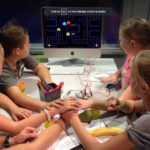Best Quotes About Play & Learning (which I stole/quote from childsplaymagazine.com)
“Play is the only way the highest intelligence of humankind can unfold.” ~ Joseph Chilton Pearce (author)
“For a small child there is no division between playing and learning; between the things he or she does ‘just for fun’ and things that are ‘educational.’ The child learns while living and any part of living that is enjoyable is also play.” ~ Penelope Leach (psychologist, author)
“Play deprivation is bad for children. Among other things, it promotes anxiety, depression, suicide, narcissism, and loss of creativity. It’s time to end the experiment.” ~ Dr. Peter Gray (author, psychologist)
“Playing should be fun! In our great eagerness to teach our children we studiously look for ‘educational’ toys, games with built-in lessons, books with a ‘message.’ Often these ‘tools’ are less interesting and stimulating than the child’s natural curiosity and playfulness. Play is by its very nature educational. And it should be pleasurable. When the fun goes out of play, most often so does the learning.” ~ Joanne E. Oppenheim (child development expert, author)
“It is paradoxical that many educators and parents still differentiate between a time for learning and a time for play without seeing the vital connection between them.” ~ Leo Buscaglia (author, educator)
“Children need the freedom and time to play. Play is not a luxury. Play is a necessity.” Kay Redfield Jamison (professor of psychiatry)
“Play is…more than just fun. Plenty of play in childhood makes for happy, smart adults – and keeping it up can make us smarter at any age.” Stuart Brown (author of The Neuroscience of Play)
“The child amidst his baubles is learning the action of light, motion, gravity, muscular force….” ~ Ralph Waldo Emerson (writer)
“The opposite of play is not work. The opposite of play is depression.” Brian Sutton-Smith (play scholar)
“The most effective kind of education is that a child should play amongst lovely things.” ~ Plato (Greek philosopher)
“Play gives children a chance to practice what they are learning…They have to play with what they know to be true in order to find out more, and then they can use what they learn in new forms of play.” ~ Fred Rogers (Mr. Rogers’ Neighborhood)
“It is becoming increasingly clear through research on the brain, as well as in other areas of study, that childhood needs play. Play acts as a forward feed mechanism into courageous, creative, rigorous thinking in adulthood.” ~ Tina Bruce (Professor,London Metropolitan University)
“The very existence of youth is due in part to the necessity for play; the animal does not play because he is young, he has a period of youth because he must play.” Karl Groos (German evolutionary biologist)
“Parents who homeschool with the greatest success love to play with their children. They learn to protect children’s playtime. They appreciate how much learning results from many kinds of play. PLAY allows the spark of creative insight to flame – a most powerful learning tool.” ~ Ann Lahrson-Fisher (homeschooling writer)
“Necessity may be the mother of invention, but play is certainly the father.” ~ Roger von Oech (President, Creative Think)
“Play permits the child to resolve in symbolic form unsolved problems of the past and to cope directly or symbolically with present concerns. It is also his most significant tool for preparing himself for the future and its tasks.” ~ Bruno Bettelheim (child psychologist)
“It is in playing, and only in playing, that the individual child or adult is able to be creative and to use the whole personality, and it is only in being creative that the individual discovers the self.” ~ D.W. Winnicott (British pediatrician)
“Close observation of children at play suggests that they find out about the world in the same way as scientists find out about new phenonoma and test new ideas…during this exploration, all the senses are used to observe and draw conclusions about objects and events through simple, if crude, scientific investigations.” ~ Judith Roden (lecturer, Canterbury Christ Church University College)
“Children learn as they play. Most importantly, in play children learn how to learn.” ~ O. Fred Donaldson (martial arts master)
“A child loves his play, not because it’s easy, but because it’s hard.” ~ Benjamin Spock (pediatrician, author)
“It’s not so much what children learn through play, but what they won’t learn if we don’t give them the chance to play. Many functional skills like literacy and arithmetic can be learned either through play or through instruction – the issue is the amount of stress on the child. However, many coping skills like compassion, self-regulation, self-confidence, the habit of active engagement, and the motivation to learn and be literate cannot be instructed. They can only be learned through self-directed experience (i.e. play). ~ Susan J. Oliver (author, Playing for Keeps)
“Play builds the kind of free-and-easy, try-it-out, do-it-yourself character that our future needs.” ~ James L. Hymes Jr. (child development specialist, author)
“The main characteristic of play – whether of child or adult – is not it content but its mode. Play is an approach to action, not a form of activity.” ~ Jerome Bruner (psychologist, professor)
“Play is not only our creative drive; it’s a fundamental mode of learning.” ~ David Elkind (psychologist, author)
“As astronauts and space travelers children puzzle over the future; as dinosaurs and princesses they unearth the past. As weather reporters and restaurant workers they make sense of reality; as monsters and gremlins they make sense of the unreal.” ~ Gretchen Owocki (childhood educator)
“The activities that are the easiest, cheapest, and most fun to do – such as singing, playing games, reading, storytelling, and just talking and listening – are also the best for child development.” ~ Jerome Singer (professor, Yale University)
“Play is the highest expression of human development in childhood, for it alone is the free expression of what is in a child’s soul.” Friedrich Froebel (founder of the concept of kindergarten)
“Almost all creativity involves purposeful play.” ~ Abraham Maslow (psychologist)
“Men should learn to live with the same seriousness with which children play.” ~ Nietzsche (philosopher, writer)
“Play is the highest form of research.” ~ Albert Einstein (scientist)





